-

Aug
17
Interpretive Summary: Protective effects of genistein on the production performance and lipid metabolism disorders in laying hens with fatty liver hemorrhagic syndrome by activation of the GPER–AMPK signaling pathways
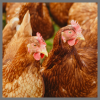
Fatty liver hemorrhagic syndrome (FLHS) is a nutritional and metabolic disease that seriously threatens the health and performance of laying hens, which is characterized by hepatic steatosis and lipid metabolism disorders. As an isoflavone phytoestrogen, genistein (GEN) exerts many beneficial functions, including alleviating lipid metabolism disorders and anti-inflammatory properties.
Read more
-

Aug
17
Interpretive Summary: Reproductive microbiome and cytokine profiles associated with fertility outcomes of postpartum beef cows
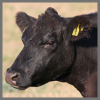
Efficiently producing cattle to feed a growing population can come with many challenges. A few challenges occur soon after a cow has given birth, and subsequent reproductive performance can be impacted. Bacteria within the reproductive tract can trigger an immune response and together play a role in affecting fertility in cows.
Read more
-

Aug
10
Interpretive Summary: Evaluating differences between formulated dietary net energy values and net energy values determined from growth performance in finishing beef steers
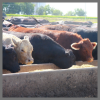
Feedlot growth performance and carcass data can be used to estimate dietary net energy values. The degree to which growth performance-predicted values agree with tabular energy values for feeds is an indication of how accurately the California Net Energy System can be used to predict cattle growth performance.
Read more
-

Aug
10
Interpretive Summary: Calves severely affected by bovine respiratory disease have reduced protection against histone toxicity and exhibit lower complement activity

Bovine respiratory disease (BRD) remains the leading cause of feedlot calf sickness and death. In respiratory disease affecting humans and mice, major tissue damage is caused by release of histones. Histones are proteins found in the nucleus of cells that condense DNA, however, cells that become damaged release histones extracellularly.
Read more
-

Aug
10
Interpretive Summary: Invited review: integration of technologies and systems for precision animal agriculture—a case study on precision dairy farming

Precision technologies are revolutionizing animal agriculture by enhancing the management of animal welfare and productivity. To fully realize the potential benefits of precision livestock farming (PLF), the development and application of digital technologies are needed to facilitate the responsible and sustainable intensification of livestock production over the next several decades.
Read more
-

Aug
10
Interpretive Summary: Impact of liquid diet supplementation while suckling and weaning age on nutritional status, intestinal health, and immunity of piglets pre- and post-weaning
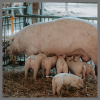
Antimicrobial resistance, induced by increased usage of antimicrobials, is a threat raising economic and public health concerns. The great amount of antibiotics used in the animal production and especially in the pig industry, where the greatest part of all prescribed antibiotics is used for treatments of diarrhea in newly weaned piglets.
Read more
-

Aug
10
Interpretive Summary: Dietary trace mineral pattern influences gut microbiota and intestinal health of broilers
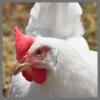
Information is still scarce regarding the effect of dietary trace mineral patterns on the intestinal health of broilers. The results indicated that dietary trace mineral pattern influenced intestinal health of broilers, and the appropriate pattern of trace minerals in the diet for intestinal health of broilers would be...
Read more
-

Aug
10
Interpretive Summary: Effect of 3-nitrooxypropanol on enteric methane emissions of feedlot cattle fed with a tempered barley-based diet with canola oil

Livestock methane (CH4) is the main source of greenhouse gases (GHGs) in agriculture, contributing to 11.6% of global GHGs emissions from human-related activities. Therefore, mitigating CH4 emissions from ruminant animals is a great opportunity for meeting the current climate targets.
Read more
-

Aug
10
Interpretive Summary: Forages and pastures symposium: an update on in vitro and in situ experimental techniques for approximation of ruminal fiber degradation

In vitro and in situ techniques are important to studying ruminant nutrition because these procedures go beyond measures of components of a feedstuff in a laboratory by fermenting a sample in ruminal fluid. The in situ procedure was first described regarding ruminant nutrition in 1938 and in vitro in 1966 and both techniques have been refined over time to improve the reliability of results.
Read more
-

Aug
03
Interpretive Summary: Ag leaders send joint letter to Governors and Administrators

The United States Department of Agriculture’s (USDA’s) Food and Nutrition Service (FNS) recently released the fiscal year 2022 Supplemental Nutrition Assistance Program (SNAP) payment error rates. The report showed an increase in payment errors. In response, House Agriculture Committee Chairman Glenn "GT" Thompson, Ranking Member David Scott, Senator John Boozman, and Senator Debbie Stabenow issued a joint statement.
Read more
-

Aug
03
Interpretive Summary: Agriculture Outlook 2023-2032 released

The Food and Agriculture Organization of the United Nations (FAO) and the Organization for Economic Co-operation and Development (OECD) recently published the OECD-FAO Agricultural Outlook 2023-2032. According to the report, global agricultural and food production is projected to continue to increase over the next ten years, but at a slower pace of growth than the previous decade due to demographic trends.
Read more
-

Aug
03
Interpretive Summary: Dairy Business Innovation Act introduced
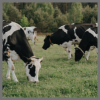
Senators Tammy Baldwin (D-WI) and Marsha Blackburn (R-TN) recently introduced the Dairy Business Innovation Act of 2023. The bipartisan legislation will reauthorize and strengthen the Dairy Business Innovation (DBI) Initiatives to help more American dairy farmers and processors add value to their businesses, including creating new products, expanding their markets, and modernizing their production facilities.
Read more
-

Aug
03
Interpretive Summary: Food insecurity at 17%

The June 2023 edition of the Consumer Food Insights from Purdue University was recently published, citing food insecurity at 17%. The Consumer Food Index, created by Purdue University’s Center for Food Demand Analysis and Sustainability, examines different annual household income categories and related consumer behaviors.
Read more
-

Aug
03
Interpretive Summary: Livestock Disaster Relief Act introduced

The Livestock Disaster Relief Act was recently introduced by Senators Jon Tester (D-MT) and John Hoeven (R-ND). The bipartisan bill would improve the Livestock Forage Program (LFP) and Emergency Assistance for Livestock Program (ELAP) to better meet the needs of ranchers impacted by natural disasters.
Read more
-

Aug
03
Interpretive Summary: Motion for summary judgement on WOTUS submitted

The National Cattlemen’s Beef Association (NCBA) has filed a motion in the United States District Court for the Southern District of Texas asking the court to strike down the Waters of the United States (WOTUS) rule in response to the Supreme Court’s decision in Sackett v. EPA. The Supreme Court ruled in favor of landowners and limited the Environmental Protection Agency’s (EPA’s) regulation powers.
Read more
-

Aug
03
Interpretive Summary: Prop 12 implementation date extended

The National Pork Producers Council (NPPC) has successfully filed a modification to extend the implementation date of Proposition 12 (Prop 12), to allow the U.S. pork industry and food supply chain additional time to transition. In late 2022, a California judge extended a stay on enforcement of the law until July 1, 2023, pending the outcome of the United States Supreme Court.
Read more
-

Aug
03
Interpretive Summary: Question 3 delayed in Massachusetts
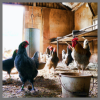
A district judge in the state of Massachusetts has delayed the implementation of the Act to Prevent Cruelty in Farm Animals (Question 3) until August 23, 2023, originally set to go into effect on August 15, 2022. Question 3 was a 2016 ballot initiative that prohibits any farm owner or operator from knowingly confining any breeding pig, calf raised for veal, or egg-laying hen in a way that prevents the animal from lying down, standing up, fully extending its limbs, or turning around freely.
Read more
-

Aug
03
Interpretive Summary: USDA Deputy Secretary confirmed

Xochitl Torres Small has been confirmed as Deputy Secretary of the United States Department of Agriculture (USDA). Torres Small was nominated by President Joe Biden in February for the position. Torres Small has a law degree from the University of New Mexico School of Law, an undergraduate degree from Georgetown University’s School of Foreign Service, and an international baccalaureate from Waterford Kamhlaba United World College of Southern Africa.
Read more
-

Aug
03
Interpretive Summary: USDA invests in meat and poultry processing
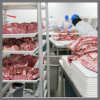
The United States Department of Agriculture (USDA) has announced that it will invest $115 million to increase meat and poultry processing capacity. USDA is providing 15 awards totaling $115 million in 17 states.
Read more
-

Jul
31
ASAS Writing Workshop

Publishing is a cornerstone of our scientific community and because of rapid changes in the publication landscape, ASAS is offering a day and a half writing workshop for graduate students and early career scientists. The workshop will concentrate on the production of a paper from start to finishing – writing to submission, to surviving the review, to picking the correct journal to publish. The workshop will be conducted by current and former editors of major Scientific journals.
Read more
 AugInterpretive Summary: Protective effects of genistein on the production performance and lipid metabolism disorders in laying hens with fatty liver hemorrhagic syndrome by activation of the GPER–AMPK signaling pathways
AugInterpretive Summary: Protective effects of genistein on the production performance and lipid metabolism disorders in laying hens with fatty liver hemorrhagic syndrome by activation of the GPER–AMPK signaling pathways Fatty liver hemorrhagic syndrome (FLHS) is a nutritional and metabolic disease that seriously threatens the health and performance of laying hens, which is characterized by hepatic steatosis and lipid metabolism disorders. As an isoflavone phytoestrogen, genistein (GEN) exerts many beneficial functions, including alleviating lipid metabolism disorders and anti-inflammatory properties.
Fatty liver hemorrhagic syndrome (FLHS) is a nutritional and metabolic disease that seriously threatens the health and performance of laying hens, which is characterized by hepatic steatosis and lipid metabolism disorders. As an isoflavone phytoestrogen, genistein (GEN) exerts many beneficial functions, including alleviating lipid metabolism disorders and anti-inflammatory properties. AugInterpretive Summary: Reproductive microbiome and cytokine profiles associated with fertility outcomes of postpartum beef cows
AugInterpretive Summary: Reproductive microbiome and cytokine profiles associated with fertility outcomes of postpartum beef cows Efficiently producing cattle to feed a growing population can come with many challenges. A few challenges occur soon after a cow has given birth, and subsequent reproductive performance can be impacted. Bacteria within the reproductive tract can trigger an immune response and together play a role in affecting fertility in cows.
Efficiently producing cattle to feed a growing population can come with many challenges. A few challenges occur soon after a cow has given birth, and subsequent reproductive performance can be impacted. Bacteria within the reproductive tract can trigger an immune response and together play a role in affecting fertility in cows. AugInterpretive Summary: Evaluating differences between formulated dietary net energy values and net energy values determined from growth performance in finishing beef steers
AugInterpretive Summary: Evaluating differences between formulated dietary net energy values and net energy values determined from growth performance in finishing beef steers Feedlot growth performance and carcass data can be used to estimate dietary net energy values. The degree to which growth performance-predicted values agree with tabular energy values for feeds is an indication of how accurately the California Net Energy System can be used to predict cattle growth performance.
Feedlot growth performance and carcass data can be used to estimate dietary net energy values. The degree to which growth performance-predicted values agree with tabular energy values for feeds is an indication of how accurately the California Net Energy System can be used to predict cattle growth performance. AugInterpretive Summary: Calves severely affected by bovine respiratory disease have reduced protection against histone toxicity and exhibit lower complement activity
AugInterpretive Summary: Calves severely affected by bovine respiratory disease have reduced protection against histone toxicity and exhibit lower complement activity Bovine respiratory disease (BRD) remains the leading cause of feedlot calf sickness and death. In respiratory disease affecting humans and mice, major tissue damage is caused by release of histones. Histones are proteins found in the nucleus of cells that condense DNA, however, cells that become damaged release histones extracellularly.
Bovine respiratory disease (BRD) remains the leading cause of feedlot calf sickness and death. In respiratory disease affecting humans and mice, major tissue damage is caused by release of histones. Histones are proteins found in the nucleus of cells that condense DNA, however, cells that become damaged release histones extracellularly. AugInterpretive Summary: Invited review: integration of technologies and systems for precision animal agriculture—a case study on precision dairy farming
AugInterpretive Summary: Invited review: integration of technologies and systems for precision animal agriculture—a case study on precision dairy farming Precision technologies are revolutionizing animal agriculture by enhancing the management of animal welfare and productivity. To fully realize the potential benefits of precision livestock farming (PLF), the development and application of digital technologies are needed to facilitate the responsible and sustainable intensification of livestock production over the next several decades.
Precision technologies are revolutionizing animal agriculture by enhancing the management of animal welfare and productivity. To fully realize the potential benefits of precision livestock farming (PLF), the development and application of digital technologies are needed to facilitate the responsible and sustainable intensification of livestock production over the next several decades. AugInterpretive Summary: Impact of liquid diet supplementation while suckling and weaning age on nutritional status, intestinal health, and immunity of piglets pre- and post-weaning
AugInterpretive Summary: Impact of liquid diet supplementation while suckling and weaning age on nutritional status, intestinal health, and immunity of piglets pre- and post-weaning Antimicrobial resistance, induced by increased usage of antimicrobials, is a threat raising economic and public health concerns. The great amount of antibiotics used in the animal production and especially in the pig industry, where the greatest part of all prescribed antibiotics is used for treatments of diarrhea in newly weaned piglets.
Antimicrobial resistance, induced by increased usage of antimicrobials, is a threat raising economic and public health concerns. The great amount of antibiotics used in the animal production and especially in the pig industry, where the greatest part of all prescribed antibiotics is used for treatments of diarrhea in newly weaned piglets. AugInterpretive Summary: Dietary trace mineral pattern influences gut microbiota and intestinal health of broilers
AugInterpretive Summary: Dietary trace mineral pattern influences gut microbiota and intestinal health of broilers Information is still scarce regarding the effect of dietary trace mineral patterns on the intestinal health of broilers. The results indicated that dietary trace mineral pattern influenced intestinal health of broilers, and the appropriate pattern of trace minerals in the diet for intestinal health of broilers would be...
Information is still scarce regarding the effect of dietary trace mineral patterns on the intestinal health of broilers. The results indicated that dietary trace mineral pattern influenced intestinal health of broilers, and the appropriate pattern of trace minerals in the diet for intestinal health of broilers would be... AugInterpretive Summary: Effect of 3-nitrooxypropanol on enteric methane emissions of feedlot cattle fed with a tempered barley-based diet with canola oil
AugInterpretive Summary: Effect of 3-nitrooxypropanol on enteric methane emissions of feedlot cattle fed with a tempered barley-based diet with canola oil Livestock methane (CH4) is the main source of greenhouse gases (GHGs) in agriculture, contributing to 11.6% of global GHGs emissions from human-related activities. Therefore, mitigating CH4 emissions from ruminant animals is a great opportunity for meeting the current climate targets.
Livestock methane (CH4) is the main source of greenhouse gases (GHGs) in agriculture, contributing to 11.6% of global GHGs emissions from human-related activities. Therefore, mitigating CH4 emissions from ruminant animals is a great opportunity for meeting the current climate targets. AugInterpretive Summary: Forages and pastures symposium: an update on in vitro and in situ experimental techniques for approximation of ruminal fiber degradation
AugInterpretive Summary: Forages and pastures symposium: an update on in vitro and in situ experimental techniques for approximation of ruminal fiber degradation In vitro and in situ techniques are important to studying ruminant nutrition because these procedures go beyond measures of components of a feedstuff in a laboratory by fermenting a sample in ruminal fluid. The in situ procedure was first described regarding ruminant nutrition in 1938 and in vitro in 1966 and both techniques have been refined over time to improve the reliability of results.
In vitro and in situ techniques are important to studying ruminant nutrition because these procedures go beyond measures of components of a feedstuff in a laboratory by fermenting a sample in ruminal fluid. The in situ procedure was first described regarding ruminant nutrition in 1938 and in vitro in 1966 and both techniques have been refined over time to improve the reliability of results. AugInterpretive Summary: Ag leaders send joint letter to Governors and Administrators
AugInterpretive Summary: Ag leaders send joint letter to Governors and Administrators The United States Department of Agriculture’s (USDA’s) Food and Nutrition Service (FNS) recently released the fiscal year 2022 Supplemental Nutrition Assistance Program (SNAP) payment error rates. The report showed an increase in payment errors. In response, House Agriculture Committee Chairman Glenn "GT" Thompson, Ranking Member David Scott, Senator John Boozman, and Senator Debbie Stabenow issued a joint statement.
The United States Department of Agriculture’s (USDA’s) Food and Nutrition Service (FNS) recently released the fiscal year 2022 Supplemental Nutrition Assistance Program (SNAP) payment error rates. The report showed an increase in payment errors. In response, House Agriculture Committee Chairman Glenn "GT" Thompson, Ranking Member David Scott, Senator John Boozman, and Senator Debbie Stabenow issued a joint statement. AugInterpretive Summary: Agriculture Outlook 2023-2032 released
AugInterpretive Summary: Agriculture Outlook 2023-2032 released The Food and Agriculture Organization of the United Nations (FAO) and the Organization for Economic Co-operation and Development (OECD) recently published the OECD-FAO Agricultural Outlook 2023-2032. According to the report, global agricultural and food production is projected to continue to increase over the next ten years, but at a slower pace of growth than the previous decade due to demographic trends.
The Food and Agriculture Organization of the United Nations (FAO) and the Organization for Economic Co-operation and Development (OECD) recently published the OECD-FAO Agricultural Outlook 2023-2032. According to the report, global agricultural and food production is projected to continue to increase over the next ten years, but at a slower pace of growth than the previous decade due to demographic trends. AugInterpretive Summary: Dairy Business Innovation Act introduced
AugInterpretive Summary: Dairy Business Innovation Act introduced Senators Tammy Baldwin (D-WI) and Marsha Blackburn (R-TN) recently introduced the Dairy Business Innovation Act of 2023. The bipartisan legislation will reauthorize and strengthen the Dairy Business Innovation (DBI) Initiatives to help more American dairy farmers and processors add value to their businesses, including creating new products, expanding their markets, and modernizing their production facilities.
Senators Tammy Baldwin (D-WI) and Marsha Blackburn (R-TN) recently introduced the Dairy Business Innovation Act of 2023. The bipartisan legislation will reauthorize and strengthen the Dairy Business Innovation (DBI) Initiatives to help more American dairy farmers and processors add value to their businesses, including creating new products, expanding their markets, and modernizing their production facilities. AugInterpretive Summary: Food insecurity at 17%
AugInterpretive Summary: Food insecurity at 17% The June 2023 edition of the Consumer Food Insights from Purdue University was recently published, citing food insecurity at 17%. The Consumer Food Index, created by Purdue University’s Center for Food Demand Analysis and Sustainability, examines different annual household income categories and related consumer behaviors.
The June 2023 edition of the Consumer Food Insights from Purdue University was recently published, citing food insecurity at 17%. The Consumer Food Index, created by Purdue University’s Center for Food Demand Analysis and Sustainability, examines different annual household income categories and related consumer behaviors. AugInterpretive Summary: Livestock Disaster Relief Act introduced
AugInterpretive Summary: Livestock Disaster Relief Act introduced The Livestock Disaster Relief Act was recently introduced by Senators Jon Tester (D-MT) and John Hoeven (R-ND). The bipartisan bill would improve the Livestock Forage Program (LFP) and Emergency Assistance for Livestock Program (ELAP) to better meet the needs of ranchers impacted by natural disasters.
The Livestock Disaster Relief Act was recently introduced by Senators Jon Tester (D-MT) and John Hoeven (R-ND). The bipartisan bill would improve the Livestock Forage Program (LFP) and Emergency Assistance for Livestock Program (ELAP) to better meet the needs of ranchers impacted by natural disasters. AugInterpretive Summary: Motion for summary judgement on WOTUS submitted
AugInterpretive Summary: Motion for summary judgement on WOTUS submitted The National Cattlemen’s Beef Association (NCBA) has filed a motion in the United States District Court for the Southern District of Texas asking the court to strike down the Waters of the United States (WOTUS) rule in response to the Supreme Court’s decision in Sackett v. EPA. The Supreme Court ruled in favor of landowners and limited the Environmental Protection Agency’s (EPA’s) regulation powers.
The National Cattlemen’s Beef Association (NCBA) has filed a motion in the United States District Court for the Southern District of Texas asking the court to strike down the Waters of the United States (WOTUS) rule in response to the Supreme Court’s decision in Sackett v. EPA. The Supreme Court ruled in favor of landowners and limited the Environmental Protection Agency’s (EPA’s) regulation powers. AugInterpretive Summary: Prop 12 implementation date extended
AugInterpretive Summary: Prop 12 implementation date extended The National Pork Producers Council (NPPC) has successfully filed a modification to extend the implementation date of Proposition 12 (Prop 12), to allow the U.S. pork industry and food supply chain additional time to transition. In late 2022, a California judge extended a stay on enforcement of the law until July 1, 2023, pending the outcome of the United States Supreme Court.
The National Pork Producers Council (NPPC) has successfully filed a modification to extend the implementation date of Proposition 12 (Prop 12), to allow the U.S. pork industry and food supply chain additional time to transition. In late 2022, a California judge extended a stay on enforcement of the law until July 1, 2023, pending the outcome of the United States Supreme Court. AugInterpretive Summary: Question 3 delayed in Massachusetts
AugInterpretive Summary: Question 3 delayed in Massachusetts A district judge in the state of Massachusetts has delayed the implementation of the Act to Prevent Cruelty in Farm Animals (Question 3) until August 23, 2023, originally set to go into effect on August 15, 2022. Question 3 was a 2016 ballot initiative that prohibits any farm owner or operator from knowingly confining any breeding pig, calf raised for veal, or egg-laying hen in a way that prevents the animal from lying down, standing up, fully extending its limbs, or turning around freely.
A district judge in the state of Massachusetts has delayed the implementation of the Act to Prevent Cruelty in Farm Animals (Question 3) until August 23, 2023, originally set to go into effect on August 15, 2022. Question 3 was a 2016 ballot initiative that prohibits any farm owner or operator from knowingly confining any breeding pig, calf raised for veal, or egg-laying hen in a way that prevents the animal from lying down, standing up, fully extending its limbs, or turning around freely. AugInterpretive Summary: USDA Deputy Secretary confirmed
AugInterpretive Summary: USDA Deputy Secretary confirmed Xochitl Torres Small has been confirmed as Deputy Secretary of the United States Department of Agriculture (USDA). Torres Small was nominated by President Joe Biden in February for the position. Torres Small has a law degree from the University of New Mexico School of Law, an undergraduate degree from Georgetown University’s School of Foreign Service, and an international baccalaureate from Waterford Kamhlaba United World College of Southern Africa.
Xochitl Torres Small has been confirmed as Deputy Secretary of the United States Department of Agriculture (USDA). Torres Small was nominated by President Joe Biden in February for the position. Torres Small has a law degree from the University of New Mexico School of Law, an undergraduate degree from Georgetown University’s School of Foreign Service, and an international baccalaureate from Waterford Kamhlaba United World College of Southern Africa. AugInterpretive Summary: USDA invests in meat and poultry processing
AugInterpretive Summary: USDA invests in meat and poultry processing The United States Department of Agriculture (USDA) has announced that it will invest $115 million to increase meat and poultry processing capacity. USDA is providing 15 awards totaling $115 million in 17 states.
The United States Department of Agriculture (USDA) has announced that it will invest $115 million to increase meat and poultry processing capacity. USDA is providing 15 awards totaling $115 million in 17 states. JulASAS Writing Workshop
JulASAS Writing Workshop Publishing is a cornerstone of our scientific community and because of rapid changes in the publication landscape, ASAS is offering a day and a half writing workshop for graduate students and early career scientists. The workshop will concentrate on the production of a paper from start to finishing – writing to submission, to surviving the review, to picking the correct journal to publish. The workshop will be conducted by current and former editors of major Scientific journals.
Publishing is a cornerstone of our scientific community and because of rapid changes in the publication landscape, ASAS is offering a day and a half writing workshop for graduate students and early career scientists. The workshop will concentrate on the production of a paper from start to finishing – writing to submission, to surviving the review, to picking the correct journal to publish. The workshop will be conducted by current and former editors of major Scientific journals.



